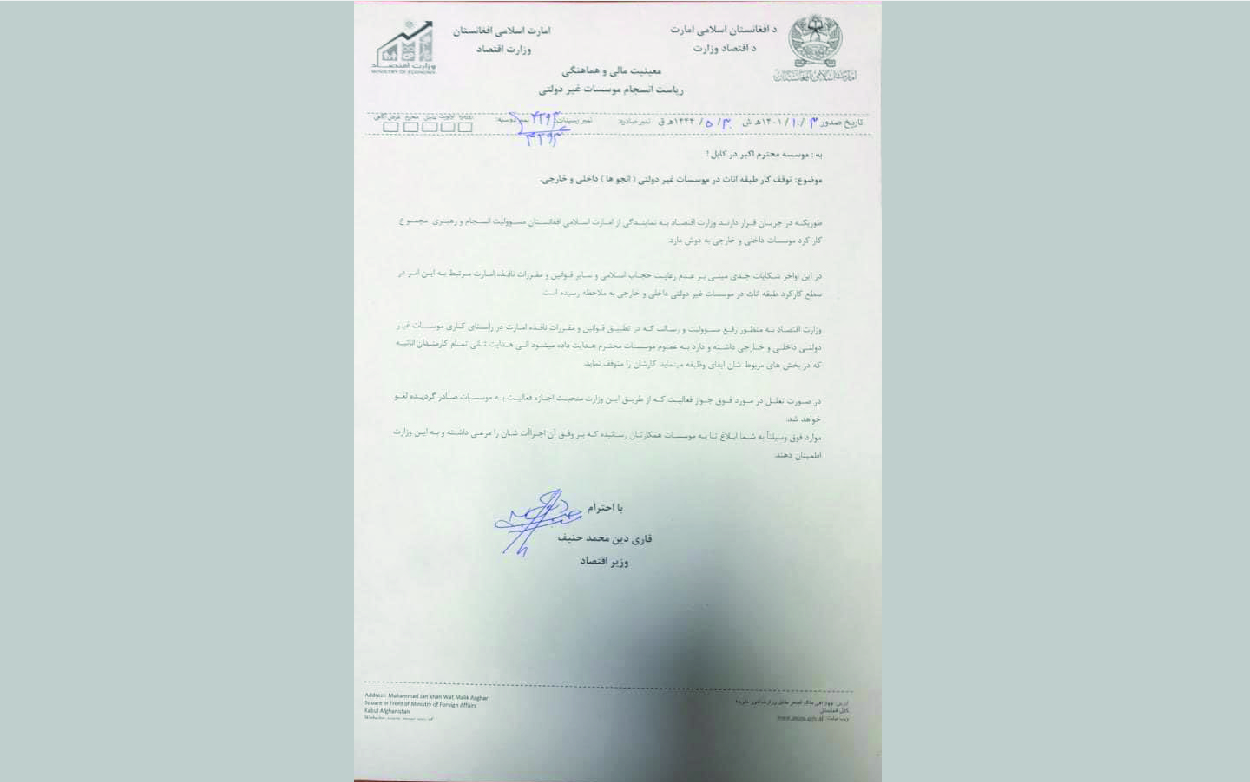The Taliban on Saturday (December 24th) ordered all foreign and domestic Non-Governmental Organizations (NGOs) in Afghanistan to suspend employing women, allegedly because some female employees didn’t wear the Islamic headscarf properly.
This order was issued in a letter from Qari Din Muhammad Hanif, the Taliban’s Economy Minister, in which it was said that any organization that does not comply with this order, their license to operate in Afghanistan will be revoked.
“Based on its responsibility, the Ministry of Economy informs all NGOs to suspend all female employees who are working in their respective departments until further notice,” the letter reads.

The recent Taliban move have followed by global reactions.
In this regard, the UN Office for the Coordination of Humanitarian Affairs (OCHA) has said that such an order violates the most fundamental rights of women, as well as being a clear breach of humanitarian principles.
The group also announced that the UN will seek to meet with the Taliban leadership to obtain clarity on the reported order.
The United Nations and its partners reminded the Taliban government that introducing restrictions on women’s freedom and systematically excluding them would jeopardize efforts for peace and stability in Afghanistan.
The spokesperson of the UN Secretary-General, Stéphane Dujarric, said in a statement on Sunday (December 25th) that this decision of the Taliban will undermine the process of providing humanitarian and vital aid to 28 million people in need.
The regional director of UNICEF in South Asia, George Laryea-Adjei, tweeted on Sunday, saying that this is the latest egregious rollback of rights for girls and women in Afghanistan.
“This latest egregious rollback of rights for girls and women will have sweeping consequences on the provision of health, nutrition and education services for children,” tweeted UNICEF
regional director.
The US special representative for Afghanistan, Thomas West, described the newest Taliban restrictions on women as profoundly irresponsible in a statement on Twitter on Sunday morning, saying that “[the Taliban] poses mortal risks to millions who depend on life-saving assistance and adding that [the] Taliban [are] ignoring their most basic responsibilities to their people.
In reaction to the Taliban’s newest restriction on women’s work, employees of the Danish Refugee Council (DRC) which provided support to UNHCR, Save the Children, INTERSOS and Swedish Committee for Afghanistan (SCA) have been asked not to go to their jobs anymore.
On Saturday another NGO in Kandahar, which had 120 female employees, also stopped its operations in Afghanistan, following the Taliban order banning women from working in domestic and foreign organizations.
A female Facebook user condemned the Taliban’s recent restrictive decision, saying that “until now, I was the only breadwinner for my household, but my job is now taken away from me. Now I am wondering what to do and where to go!”
The Ministry of Foreign Affairs of Norway has also issued a statement condemning the Taliban order banning women from working in Afghanistan in domestic and foreign NGOs.
“I strongly condemn the ban on female employees of NGOs in Afghanistan. This decision must be reversed immediately. Norway will review the situation with partners and issue an appropriate response,” the statement issued by Norwegian Foreign Minister, Anniken Huitfeldt, reads.
UN Secretary General’s Deputy Special Representative for Afghanistan, Ramiz Alakbarov, expressed his deep concern about this new order of the Taliban leader in a tweet on Saturday night.
“Deeply concerned by reports that de facto authorities issued a circular barring all female employees of national and international organizations from going to work. Clear breach of humanitarian principles. Women critical role all aspects of life& humanitarian response is undeniable,” Alakbarov tweeted.
The Taliban government on Saturday also banned women from attending religious classes at the mosques in Kabul.












